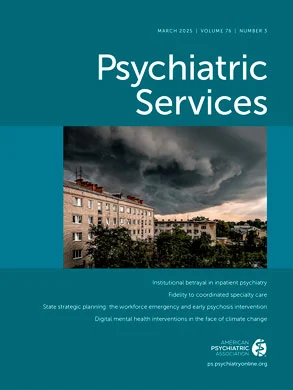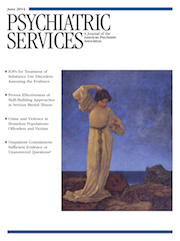One reason for the reluctance to specialize in psychiatry may be the high work-related demands and associated stress among mental health professionals (
5). Among British psychiatrists, 54% experienced irritation and 39% experienced emotional exhaustion weekly (
6). Two-thirds of New Zealand psychiatrists reported moderate to severe emotional exhaustion and low levels of personal accomplishment (
7). A review article concluded that psychiatrists experience significant levels of stress because of several factors, including overwork, lack of time, and management and resource issues (
8). Margison (
9) has suggested that overwork, relationships with other staff, inadequate resources, and dealing with “difficult,” violent patients are among important sources of stress among psychiatrists. Psychiatry residents have been found to have higher numbers of traumatic stress experiences and to be at higher risk of threats and violent acts by patients compared with residents in general medicine, surgery, and obstetrics and gynecology (
10).
Psychiatrists have been found to be dissatisfied more often with their medical career compared with other specialists or general practitioners (
11). Moreover, psychiatrists have elevated suicide risk compared with other physicians (
12). Research also suggests that psychiatrists have a higher level of burnout than other physicians (
13). Psychiatrists also reported higher work-related emotional exhaustion and severe depression compared with a combined group of physicians and surgeons (
14). One factor that may contribute to these findings is personality profile. Research suggests that psychiatrists are more prone to negativity compared with other physicians, and this personality profile might predispose them toward stress (
14). Psychiatrists’ personality has also been found to be associated with a proneness to burnout (
15).
Thus previous studies suggest that psychiatrists may feel worse and be more stressed than other medical specialists and mental health professionals. However, more information is needed about how specific work-related stress factors affect psychiatrists’ well-being and how work-related resources may serve to buffer some of these stressors. The aim of this study was to examine whether there were differences in stress factors, job resources, and well-being between psychiatrists and other medical specialists. It also examined whether differences in stress factors, job resources, or personal optimism accounted for potential differences in well-being between psychiatrists and other medical specialists. It also analyzed whether interactions of specialty and stress factors, job resources, and personal optimism had any effects on well-being. For example, high levels of job resources might mitigate the negative consequences of stress factors, such as time pressure or patient-related stress. We expected that psychiatrists would have higher levels of stress factors and lower well-being compared with other medical specialists and that stress factors and job resources would partly account for the differences in well-being.
Results
The characteristics of the study sample are shown in
Table 1. Almost half (47%) of the participants worked at hospitals, 16% worked in the private sector, and 15% worked in primary care. Approximately 11% of the sample were psychiatrists. Compared with other medical specialists, psychiatrists were older, were more likely to be women, and were less likely to work in primary care.
Table 2 shows the bivariate correlations among study variables.
Table 3 shows the results regarding the associations of specialty with outcome measures. Psychiatrists had higher levels of patient-related stress, job control, team climate, and distress compared with other medical specialists. In addition, psychiatrists had lower levels of job satisfaction than other medical specialists. There were no differences according to specialty in time pressure, work interference with family, and optimism.
In addition, we examined the effects of interactions of specialty with stress factors, job resources, and optimism on well-being but all the interactions were nonsignificant.
Table 4 shows the effects of different adjustments of the models examining the association of specialty and well-being (psychological distress and job satisfaction). The association between specialty and psychological distress was nonsignificant after the model was adjusted for time pressure and patient-related stress. However, the association between specialty and job satisfaction remained significant after all adjustments.
Discussion
Our results showed that psychiatrists were less satisfied with their jobs and had higher levels of patient-related stress and psychological distress compared with other medical specialists. However, psychiatrists had more job resources than other medical specialists, meaning they had better opportunities to control their jobs and better team climate. Our results suggest that the stress associated with difficult-to-treat patients was connected to the high rates of psychological distress among psychiatrists.
Our results are in line with previous studies showing lower job satisfaction and higher levels of traumatic stress experiences among psychiatrists or psychiatry residents than among other medical specialists or residents of other specialties (
10,
11). Psychiatrists have also been found to have higher suicide risk and higher levels of burnout, emotional exhaustion, and depression compared with other physicians (
12–
14). However, in Italy, there were no differences among GHQ-12 scores, an indicator of psychiatric morbidity, of psychiatrists and of a normative sample and a sample of general practice and hospital physicians (
13).
Our results highlight the strenuousness of working with anxious, restless, and disruptively behaving patients. Psychiatrists had significantly higher levels of patient-related stress compared with other medical specialists, and this stress seemed to be associated with higher psychological distress. Some research suggests that psychiatrists view aggressiveness among patients as the factor that causes them the most stress (
8). Because of the nature of their work, psychiatrists are exposed to patients who have difficult and often violent behaviors (
30). That is particularly true for residents and young psychiatrists (
31). For example, in New Zealand 46% of psychiatrist had encountered verbal threatening, 39% had been physically intimidated by patients, and 16% had been assaulted (
32).
Thus to improve the retention and recruitment of psychiatrists and to increase the attractiveness of psychiatry as a specialty choice, it would be important to try to decrease problems with patients. Recent work in the United Kingdom found that psychiatry was rejected as a specialty most commonly because of factors related to job content, such as types of patient and nature of the work (
33). Faulkner and colleagues (
34) have concluded that incidents of threat and assault are probably inevitable in most psychiatric careers, and they suggested that psychiatrists should increase their awareness of this danger, consider various response options in advance, and ensure that their practice settings provide easy access to help and escape. Hoag-Apel (
35) has suggested appointing a risk assessment team and training staff to prevent violence in health care, for example, by noticing body language, being alert to tone of voice, and avoiding taking anger personally. It has also been shown that reducing staff stress by improving staff’s cognitive efficiency and emotional control can lead to reduced violence (
36).
Our results showed that psychiatrists had more opportunities to control their jobs and had better team climate compared with other medical specialists. Psychiatrists’ jobs include interacting with patients with difficult behaviors, and it can be quite challenging to try to reduce the confrontation of patients with aggressiveness and other difficult behaviors. Thus further improving job resources could be an important way to improve psychiatrists’ well-being. For example, job control affects coping strategies, providing flexibility to avoid certain tasks and take breaks to regulate emotional responses (
37). Thus opportunities to control one’s job may be especially important for psychiatrists, given the challenges of interacting with difficult-to-treat patients. However, two-thirds of British psychiatrists perceived having less influence over their work than they wished (
6). For example, greater freedom over start and finish times, more discretion over how tasks are performed, and autonomous or self-regulated work teams could increase job control (
38). Among Swedish and English psychiatrists, it has been found that participation in the work organization is among the important factors for well-being (
39).
Team climate also seemed to be an important resource for psychiatrists. A previous study showed that poor work climate was a possible source of stress among physicians (
40). Team climate refers to a team’s shared perceptions of the quality of teamwork and cooperation (
24). For clinical health care teams, the team climate has been improved by enabling team members to increase their own skills while working in an interprofessional team, empowering each team member to feel valued and promoting the effective contribution of employees’ own professional expertise to the goals of the team (
41). In addition, formal teamwork training focusing on team communication, plan execution, team skill improvement, maintenance of team structure and climate, and problem-solving strategies has been found to be effective in improving the quality of team behaviors (
42).
Our results did not show differences between psychiatrists and other medical specialists in time pressure or in work interference with family. Overwork and lack of time have been suggested to be among the important reasons behind the stressful nature of psychiatrists’ work (
8,
9). Our results imply, however, that patients who have difficult behaviors are a very important source of psychological distress among Finnish psychiatrists, at least as compared with results for other medical specialists.
This study relied on self-reported measures, which may lead to problems associated with an inflation of the strengths of relationships and with the common method variance. Because this study was cross-sectional, we cannot draw any causal inferences. It is possible that self-selection of physicians to psychiatry could explain part of our results. Therefore, we also examined the effect of personality, namely optimism, and found no difference in optimism between psychiatrists and other medical specialists. Optimism did not account for the differences between the two groups in psychological distress and job satisfaction. Moreover, although we controlled for age, gender, and employment sector, we cannot rule out the possibility of residual confounding. In addition, we used only a decision authority scale for assessing job control and only a participative-safety scale for assessing team climate; thus the scales did not catch all the aspects of these measures. The generalizability of our findings to psychiatrists from other countries should be attempted cautiously, given that there may be big differences in workload among psychiatrists in different countries. However, it seems that the weekly work hours of Finnish psychiatrists correspond quite well to those of psychiatrists in the United States, for example.

